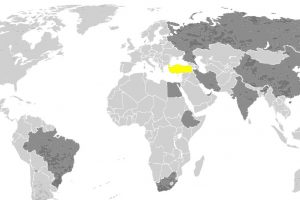Whether the June 24 elections wrap up in the first or second round, Erdoğan is likely to come out the winner in the end
The excitement of Turkey’s presidential and parliamentary elections scheduled for this weekend has also captivated foreign media, whose analyses have suggested the promise of the opposition and that it will be the downfall of President Recep Tayyip Erdoğan.
This demonstrates two facts. The first is that Turkey has vigorous and dynamic opposition parties that can freely carry out their campaigns for the public via national and foreign media.
Another important fact is that Erdoğan is a leader who can be toppled with elections – meaning Turkey is not ruled by a dictatorship. Even though the Justice and Development Party (AK Party) came in first in the June 7, 2015 elections, it could not gain a majority, leading foreign media to praise our democracy; but why doesn’t the same praise pour in when Erdoğan wins? For these elections, however, we are about to finalize a fair and transparent vote freely monitored by international institutions.
Considering the circumstances, I would like to talk about the possible outcomes of the June 24 elections. Although some polls point to Erdoğan’s possible loss in the first round, my personal opinion is that he will win, even if it is by a razor-thin margin. In the event that a second round is held, I think Erdoğan will win with an overwhelming majority of more than 60 percent. In the end, the people will not embark on an unknown adventure with a candidate who is not deemed worthy of chairmanship even in his own party, who lacks a significant career and who managed only one private teaching institution that ended in bankruptcy.
Even if Erdoğan has difficulty in the first round against the multi-alternative candidates from different ideological bases, once the number of candidates is reduced to two, he is likely to overcome this challenge and remain president until the 2023 elections.
It seems that some believe that the AK Party will lose its majority in Parliament. However, according to most polls, the AK Party holds 45 percent of the vote and its alliance partner, the Nationalist Movement Party (MHP), appears to hold at least 5 percent; so they still have the potential of holding onto their majority.If Republican People’s Party (CHP) candidate Muharrem İnce passes 30 percent, it will still not be enough for him to defeat Erdoğan but might be enough for him to challenge CHP Chairman Kemal Kılıçdaroğlu within the party. Since it seems that Good Party (İP) presidential candidate Meral Akşener will be stuck at around 7-8 percent, she will maintain her political life outside Parliament thanks to the İP’s alliance with the CHP.
Of course, in the event that she has a rival for chair from among other İP members who are members of Parliament, things might become very difficult for her. As for the Peoples’ Democratic Party (HDP), its success seems to revolve around passing the 10 percent election threshold. However, according to the polls, the party has a voting potential that hovers between one point above and one point below the threshold.
We see that the opposition has implemented a different strategy in these elections by diversifying the field more than ever – the Felicity Party (SP) for the conservatives, the İP for the nationalists and the CHP and HDP for the secularists.
So far, it seems this has been more effective than the 2014 presidential elections and at least creates a quandary for a greater number of voters. However, what percentage of these votes will be taken from the AK Party and what percentage will be taken from each other will become clear on the night of June 24.
Source: Daily Sabah







Add Comment